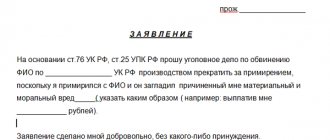A recognizance not to leave may be imposed by a preliminary investigation or court in relation to a suspect or accused of a crime; it is regulated by Article 102 of the Code of Criminal Procedure of the Russian Federation. This preventive measure is chosen only for crimes of minor (up to 3 years) and medium gravity (up to 10 years).
You must understand that the period of being under recognizance not to leave does not count towards the sentence; this only happens with arrest and house arrest.
The essence of a recognizance not to leave is based on three principles. The first principle is the restriction of freedom of movement, the second principle is the obligation to appear immediately when called by the investigator, and the third principle is not to interfere with the investigation.
Definition
What is a recognizance not to leave? According to Art. 102 of the Code of Criminal Procedure of the Russian Federation is a criminal procedural measure of restraint applied at the stage of trial or investigation and chosen in relation to a specific person (accused or suspect).
The essence of a recognizance not to leave is the written imposition of certain obligations limiting freedom of movement. Among them are:
- Do not leave your place of residence (permanent or temporary) without the permission of the judicial authority or the official investigating the case. In this case, the address recorded in the documents is indicated by the accused himself. In this regard, the person against whom this preventive measure has been chosen is obliged to notify the investigator even about those moves that are made within one locality, not to mention trips to another city or region;
- To appear at the summons or invitation of an investigator, judicial authority or interrogating officer within a strictly prescribed period;
- Do not interfere with the proceedings of the case;
- Do not take actions that put pressure on participants in the process. This means that it is better for the suspect or accused to exclude any contact with people who take part in the criminal process and can influence the course of the investigation (victims, experts, witnesses, their relatives and loved ones).
A written undertaking not to leave allows a citizen to lead a full life - go to work, move around the city, meet with friends, etc.
○ How to cancel the travel ban?
So, let’s say you find out that a bailiff has issued a temporary restriction on leaving Russia for you, you need to take into account that the same second after paying the debt, the measure cannot be canceled. The procedure should be as follows: 1) Send the bailiff a copy of the payment document confirming payment of the debt. 2) Receive a copy of the resolution canceling the temporary restriction on leaving the Russian Federation, certified by the signature of the senior bailiff and the official seal. 3) Wait, specifying the deadline for sending the document to the central unit of the Border Service.
As practice shows, from the moment the cancellation order is issued until the information is accepted and processed by border guards, it takes about 10-14 days. The procedure cannot be carried out earlier due to bureaucratic difficulties. If you have any questions, you can consult for free via chat with a lawyer at the bottom of the screen or call by phone (consultation is free), we work around the clock.
That is why I recommend in advance,
at least a month before the trip , to obtain information about the presence of debts from the FSSP of Russia. Otherwise, the vacation will be ruined, and no one will compensate for the losses. Lawyer Alexey Kolegov talks about the consequences of the ban and answers questions. Published by: Vadim Kalyuzhny , specialist of the TopYurist.RU portal
Grounds for recognizance not to leave
In what cases is a written undertaking not to leave the place used? This type of preventive measure is chosen:
- If a citizen obstructs the investigation;
- If there is a risk of destruction of direct or indirect evidence;
- If there is a risk that the accused or suspect may pose a threat to the health and life of the participants in the case;
- If there is a risk that the accused or suspects will continue to commit crimes;
- If there are fears that the accused or suspect will hide from the investigation and law enforcement agencies.
A preventive measure in the form of a recognizance not to leave the place is chosen only when committing a crime of moderate or minor gravity, that is, only in the case when the offense does not pose a danger to society, and the penalty is not associated with imprisonment.
Who is not given a written undertaking not to leave?
As for persons in respect of whom a recognizance cannot be applied, these include:
- Citizens who are accused or suspected of committing grave and especially grave acts;
- People whose professional activities involve frequent travel and business trips (conductors, truck drivers, etc.);
- Military personnel on compulsory service do not have the right to leave the unit without the permission of the commander, and therefore will not be able to appear when called by the bailiff;
- Persons who do not have permanent or temporary registration and are in a given locality on a business trip, visiting, on vacation or for sanatorium treatment;
- Diplomatic couriers;
- Witnesses. Can a witness be given this preventive measure? According to the law, this cannot be done, but he may be given an obligation to appear (Article 102 of the Code of Criminal Procedure of the Russian Federation), forcing him to inform the investigation of his place of stay and appear at the first request of the interrogating officer.
When making a decision on the use of this preventive measure, the investigator or judge evaluates all objective and subjective factors.
If there is the slightest doubt that a citizen will strictly fulfill the obligations given to him, other methods of restricting freedom are chosen (house arrest or detention).
○ Are debtors prohibited from leaving?
I have listed above cases in which it is impossible to leave Russia - the Border Service will simply refuse to cross the border. Citizens are aware of most of these grounds - for example, when signing an employment contract or joining the FSB, the employee is informed about the prohibition of foreign holidays separately, under a personal signature. The same is true in the case of criminal prosecution, assignment of the status of a suspect or accused. The situation is more complicated with persons who have debt, the existence of which has been confirmed by the court. At risk are citizens in respect of whom there is a court decision to collect debts from them (for example, alimony, debts for housing and communal services, etc.). According to the current legislation on enforcement proceedings, if the debtor does not execute a court decision without good reason and does not take measures to repay the debt, the bailiff has the right to issue a ruling on a temporary restriction on leaving the Russian Federation . This document is sent to the Border Service, and its validity period is 6 months. If, after six months, no measures have been taken to repay the debt, the measure may be extended for the same period. The law defines the minimum amount of debt, in the presence of which this measure is applied to debtors - 30,000 rubles (in October 2017, amendments to the laws came into force, the amount was increased 3 times), but the rules of law stipulate separately that it is possible to ban travel by court decision , and at the request of the claimant. A debt of 30 thousand rubles can be cumulative, based on several court decisions and in favor of several collectors. The subject of execution can be anything - from a fine imposed by the court to a large loan that is not repaid on time (see is it possible not to pay a loan legally?).
Lawyer's note: if you are denied permission to cross the border on this basis, no one will return the money spent on tickets and vouchers - all losses fall on the shoulders of the debtor!
Who is authorized to choose a recognizance not to leave?
A written undertaking not to leave the place and proper behavior as a preventive measure can be chosen by a circle of persons specified in the Code of Criminal Procedure. These include employees conducting inquiries, investigations and trials.
If a suspect or person under investigation needs to leave their place of stay or residence, they must submit a written request to the head of the investigation.
The official conducting the inquiry can either allow these actions or prohibit them. The response to the petition is drawn up in 2 copies, one of which is given to the accused or suspect.
On a note! The refusal of the application can be appealed to the prosecutor's office.
Issuance procedure
According to the legislation in force in Russia in 2021, the procedure for issuing this preventive measure consists of several stages (Article 101 of the Code of Criminal Procedure of the Russian Federation):
- Adoption of a resolution (by the investigator) or a ruling (by the court) regarding the choice of a recognizance not to leave as a preventive measure.
- Drawing up the text of a document that indicates the type of criminal act and the grounds for issuing a recognizance not to leave a person.
- Announcing this decision to the suspect or accused.
- Explaining to the citizen the conditions and grounds specified in the document. If this step is skipped, the suspect or accused can issue a waiver.
- Explaining to the person the procedure for appealing the decision to apply the specified preventive measure.
- Signing of a document by a citizen to whom it applies. This procedure takes place in the presence of authorized bodies and parents, guardians or guardianship authorities if the signatory is a minor.
Is it possible not to sign a written undertaking not to leave? It is undesirable to do this, otherwise another measure of restriction of freedom will be applied.
If you categorically disagree with this decision, go to court with a corresponding complaint.
○ Travel ban. General rules.
According to the current Federal Law “On the procedure for leaving the Russian Federation and entering the Russian Federation,” there is a list of reasons, the presence of which will make it very difficult to leave the borders of Russia. Such reasons include:
- Access to information constituting a state secret.
- Serving in the armed forces upon conscription or performing alternative service.
- Status of a suspect or accused of committing a crime, current criminal punishment.
- The presence of unfulfilled obligations imposed by the court.
- Determining the fact that when preparing travel documents, a citizen provided deliberately false information.
- Service in the FSB (and now, since 2015, the Ministry of Internal Affairs!).
If you have any questions, you can consult for free via chat with a lawyer at the bottom of the screen or call by phone (consultation is free), we work around the clock.
This list includes general grounds that may prevent you from traveling abroad. In addition, it must be taken into account that a travel ban is always temporary; no one can be deprived of this right for life. I will tell you below about the timing of the border crossing ban in one case or another.
Responsibility for violation of subscription
What happens if you violate the preventive measure? In Art. 110 of the Code of Criminal Procedure of the Russian Federation states that violation of obligations under a written undertaking not to leave is grounds for replacing this preventive measure with taking into custody or house arrest.
Their validity period is similar to the validity period of the undertaking not to leave, that is, until the end of the investigation or trial. To change the preventive measure, a corresponding resolution is issued.
The situation may worsen if the inquiry officer, investigator or judge suspects that the suspect or person under investigation wants to hide from law enforcement agencies or intends to obstruct the investigation.
If he still manages to do this, but is subsequently discovered by investigative authorities, more stringent measures may be applied. Thus, a person who has violated the terms of his recognizance not to leave is put on the criminal wanted list.
In the future, his capture could lead to serious consequences, including imprisonment. In addition, such behavior can adversely affect the course of the investigation and the trial.
If a citizen has violated the terms of the document unintentionally, upon arrival home he must urgently appear before a judge, investigator or interrogator and repent of his action.
Duration of restriction of freedom of movement
The validity period of the recognizance not to leave is established by the inquiry officer, judge or investigator . This information is not indicated on the form itself, but all authorized persons are required to know the exact period of time this preventive measure is in effect:
- Until the end of the preliminary investigation;
- For the period of preliminary investigation;
- During the trial.
But there are also clearer deadlines . Thus, a recognizance not to leave the place issued to a suspect is valid for only 10 days. At the end of this period, he must either be cleared of suspicion (due to lack of evidence) or charged.
If the latter does not happen, the preventive measure is lifted automatically. In this case, it is necessary to obtain a resolution to cancel the travel ban from the official who issued the subscription. The document issued to the witness has the same validity period.
How long is this preventive measure given to the accused? In this case, it will remain in effect until the verdict is pronounced.
○ Departure for employees of the Ministry of Internal Affairs and civil servants.
As mentioned above, a number of executive authorities and law enforcement agencies restrict their employees from traveling outside Russia. Typically, such prohibitions are conditioned by the preservation of state security and legal norms governing restrictions associated with the performance of public service. As a rule, such a prohibition remains in effect for the entire duration of the service contract, and sometimes for a certain period after dismissal. A number of structures also have a list of foreign countries to which travel is possible based on an employee’s report to the commanding staff. To clarify the information, I recommend contacting the personnel department - the employees of this service will provide you with up-to-date and detailed information on this issue.
✔ The situation in Ukraine and the ban on the departure of security forces.
The difficult situation in Ukraine and the escalation of the conflict between the Eastern and Western worlds have caused a ban or limited travel abroad for the following categories of citizens:
- Employees of the Ministry of Internal Affairs.
- FSKN employees.
- Employees of the prosecutor's office and the investigative committee.
- Judges.
- Persons specifically targeted by “sanctions”: deputies, politicians.
This limits the right and freedom of movement, but my opinion is correct. The story of the Dozhd TV channel: A ban on travel for employees of the Ministry of Internal Affairs. Investigation into how employees circumvent prohibitions.
Legal violation of conditions
Is it possible for a person under recognizance not to leave to travel to another city?
If a citizen who has received this preventive measure has an urgent need to violate the terms of the document, he is obliged to contact government officials (investigator, interrogator or judge).
In this case, a written request is drawn up, which includes the following information:
- Exact dates of absence;
- Reasons for leaving;
- Evidence confirming the need to travel to another locality (for example, a certificate of health of a relative).
And then everything depends on the decision of the authorities . If it is positive, the accused or suspect receives permission to travel outside the place of residence or stay.
When arriving in another territory, you must obtain a stamp of arrival from local law enforcement agencies. Otherwise, such actions will be taken as an attempt to escape, and violation of the undertaking not to leave will be punished.
Legal alternatives to a recognizance not to leave also include a petition to choose another preventive measure . For example, a citizen may undertake a personal appearance obligation, which involves visiting the court or the investigator’s office upon first request.
Is it possible to travel abroad in this case? The obligation to appear in person allows the accused or suspect to move freely not only within the country, but also outside its borders.
○ Ban on traveling with children.
Special rules are established by law for crossing the border by minors. So, if a child goes abroad with one of the parents, in general, permission from the other parent is not required. However, if the second spouse disagrees, he may prohibit the child from traveling abroad by writing appropriate statements to the Federal Migration Service or border control authorities. Again, some countries require permission from the other parent for the child upon entry. Or it is often necessary when applying for a visa, so to avoid being turned away from the plane, obtain a notarized parent’s permission to travel.
✔ If the spouses are divorced.
If the parents are divorced and the child lives with the mother, then when planning a trip outside of Russia, it is necessary to obtain the father’s permission.
Otherwise, the border guards will deny the child permission to leave. If you have any questions, you can consult for free via chat with a lawyer at the bottom of the screen or call by phone (consultation is free), we work around the clock.
Obtaining such permission is very simple - you just need to contact a notary, who, in the personal presence of both parents, will issue a document in the prescribed form.
✔ Single mothers.
The situation is more complicated with single mothers and in cases where the location of the second parent is unknown. Unfortunately, unless the parent in hiding has been deprived of parental rights, traveling abroad will not be possible.
Early lifting of restrictions
If there are motivated and justified reasons, the undertaking not to leave may be canceled or changed to another preventive measure. This decision is made on the basis of a citizen’s application by a judicial authority or the prosecutor’s office.
The request is granted in several cases:
- If during the investigation the innocence of the accused or suspect is established;
- There is no need for constant monitoring.
The corresponding resolution is written in 2 copies . One of them is issued to the citizen, the second remains with the prosecutor in charge of the case.
As practice shows, operational services do not always receive relevant information on time. In order to avoid various problems, it is better to keep the decision to lift the preventive measure for some time (especially for those who are going abroad).
Now you know what a written undertaking not to leave means and what obligations it imposes. If you are not sure about the correctness of the decision, seek qualified legal assistance.
○ Checking for a travel ban.
You may know about the existence of a travel ban from an employment agreement or contract, a court decision or verdict, a written undertaking not to leave, as well as from an additional order.
If you have any questions, you can consult for free via chat with a lawyer at the bottom of the screen or call by phone (consultation is free), we work around the clock.
Checking a travel ban due to debt is also very simple.
So, the procedure here is as follows: 1) You can find out about the presence of debt on the official website of the FSSP of Russia in the section “Data Bank of Enforcement Proceedings”. By filling out the fields of the form, you can obtain information about whether there are unexecuted court decisions - grounds for restricting travel outside the homeland. 2) If the search does not produce results, and you have no debts, you can go on a trip with peace of mind - in the absence of other restrictions, there will be no problems crossing the border. 3) If you find yourself on the list of debtors, the debt will need to be paid - only payment of the debt can serve as a guarantee of unhindered departure. The response form about debts contains information about the bailiff who is in charge of the court decision and his contacts. 4) Contact the bailiff, inform him about the payment, and also find out whether he issued a decision on a temporary restriction on travel. If the bailiff sent the document to the Border Service, you will need to go through the procedure of canceling it - and this takes time.









